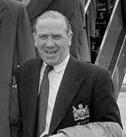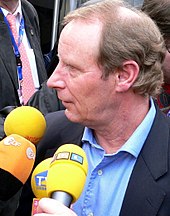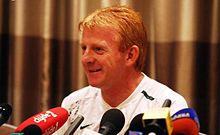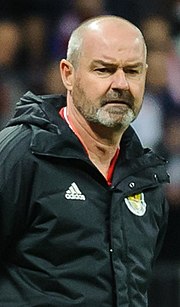Scotland national football team
Scotland have qualified for the FIFA World Cup on eight occasions, and the UEFA European Championship four times, but they have never progressed beyond the first group stage of a finals tournament.
[6] The team have achieved some noteworthy results, such as beating the 1966 FIFA World Cup winners England 3–2 at Wembley Stadium in 1967.
[11] Scotland continued to contest regular friendly matches against European opposition and enjoyed wins against Germany and France before losing to the Austrian "Wunderteam" and Italy in 1931.
[20] Ormond lost his first match in charge 5–0 to England, but recovered to steer Scotland to their first World Cup finals in 16 years in 1974.
[20] The team made a strong start under MacLeod by winning the 1977 British Home Championship, largely thanks to a 2–1 victory over England at Wembley.
[26] During the build-up to the 1978 FIFA World Cup, MacLeod fuelled the hopes of the nation by stating that Scotland would come home with a medal.
[33] The 1–1 draw meant that Scotland progressed, but as the players and fans celebrated, Stein suffered a heart attack and died shortly afterwards.
[20] Scotland qualified by winning 2–0 against Australia in a two-leg playoff, but were eliminated from the tournament with just one point from their three matches, a goalless draw with Uruguay following defeats by Denmark and West Germany.
[43] John Collins equalised from the penalty spot to level the score at 1–1, but a Tom Boyd own goal led to a 2–1 defeat.
[46] Scotland reached the qualification play-offs for Euro 2004, where they beat the Netherlands 1–0 at Hampden Park, but suffered a 6–0 defeat in the return leg.
Improved results meant that Scotland rose up the FIFA rankings and won the Kirin Cup, a friendly competition in Japan.
[61] Burley was allowed to continue in his post after a review by the SFA board,[62] but a subsequent 3–0 friendly defeat by Wales led to his dismissal.
[67] Levein left his position as head coach following a poor start to 2014 FIFA World Cup qualification, having taken just two points from four games.
[75] In qualification for the 2018 FIFA World Cup, Scotland were drawn in the same group as England, facing their rivals in a competitive fixture for the first time since 1999.
[82] The team failed to qualify automatically for UEFA Euro 2020, but consecutive victories in penalty shootouts in the playoffs against Israel[83] and Serbia put Scotland into their first major tournament since 1998.
[104] Viaplay announced in July 2023 that it would withdraw from serving the UK market,[105] which resulted in Scotland games during the 2024–25 UEFA Nations League being shown on ITV4 and YouTube.
[106][107] The arrangements to show Scotland matches on subscription services were criticised in 2008 by the Scottish Government, who argued that all competitive internationals should be a Listed Event that can only be broadcast on free-to-air television.
[112] The Scottish Affairs Committee of MPs in the British House of Commons published a report in 2023 calling for more co-operation between rights holders.
[136] A former Prime Minister, Lord Rosebery was an influential figure in Scottish football, serving as honorary President of the SFA and Edinburgh team Hearts.
[142][143] The Tartan Army have been awarded a Fair Play prize by the Belgian Olympic Committee[144] and were named as the best supporters during the 1992 European Championship.
Craig Brown held the position for the longest to date; a tenure of 9 years, comprising two major tournaments and a total of 71 matches.
Beattie (1954), Dawson Walker (1958), Willie Ormond (1974), Ally MacLeod (1978), Jock Stein (1982), Alex Ferguson (1986), Andy Roxburgh (1990 and 1992), Brown (1996 and 1998) and Steve Clarke (2020) have all managed the team at major competitions.
German coach Berti Vogts became the first foreign manager of the team in 2002, but his time in charge was generally seen as a failure and the FIFA World Ranking declined to an all-time low of 88 in March 2005.
[47][3] Walter Smith and Alex McLeish achieved better results, with the ranking improving to an all-time high of 13 in October 2007,[2] but both were only briefly in charge before returning to club management.
[90] The following table provides a summary of the complete record of each Scotland manager, including their progress in both the World Cup and the European Championship.
The qualifying mark of 50 appearances means that many notable Scotland players including Jim Baxter, Davie Cooper, Hughie Gallacher (and every other pre-Second World War player), Archie Gemmill, John Greig, Jimmy Johnstone, Billy McNeill, Bobby Murdoch and Lawrie Reilly are not on the roll of honour.
The Hampden Park crowd was officially recorded as 149,415, though the true figure is unknown as a large number of additional fans gained unauthorised entry.
FIFA ruled that all its member associations must provide "broken-time" payments to cover the expenses of players who participated in football at the 1928 Summer Olympics.
In response to what they considered to be unacceptable interference, the football associations of Scotland, England, Ireland and Wales held a meeting at which they agreed to resign from FIFA.
An agreement was reached in May 2009 whereby the FA would be permitted to organise a team using only England-qualified players,[173] but this was successfully challenged by the British Olympic Association.












